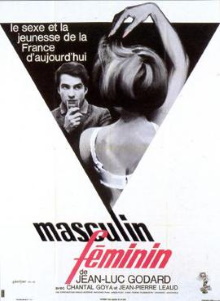
After a slew of not that challenging to watch films, here’s one by Jean-Luc Godard whose works can always be relied on to mystify the audience. This one even stars Jean-Pierre Léaud, unrecognizable though he is from his The 400 Blows days, so its inclusion in the canon of the French New Wave is unquestionable. With almost no plot, a very idiosyncratic organisation and enlivened by unexplained odd events, it certainly makes you work to puzzle it out.
Paul is a young man in Paris who has just completed his mandatory military service and is happy to be out and about. In a cafe, he meets Madeleine, as aspiring singer who also works at a magazine. They turn out to have friends in common and Paul soon decides to romantically pursue her despite them seeming to have little in common. Meanwhile he also spends time with his friend Robert who a political activist. They distribute leaflets to promote leftist causes and oppose the American war currently ongoing in Vietnam. Later Paul is thrown out of the flat he lives in and manages to convince Madeleine to let him stay with her. This results in a somewhat bizarre household as Madeleine also stays with two other female housemates, Elisabeth and Catherine.
As the scenes jump here and there with little sense of continuity, it’s hard to make any sense of what’s going on. It also doesn’t help that Paul keeps going across strange incidents that never explained or followed up on. In his very first encounter with Madeleine for example, they partially overhear an argument between a man and a woman and later when the man storms out of the cafe, the woman follows him and shoots him with a gun. Another incident has Paul recounting a sensation of being followed while he is walking on the street and yet when he confronts the person following him, it turns out to be a different person every time. Perhaps more frustrating is that important events happen in the background that the audience has no knowledge of. The first time we realize anything of Paul’s new living situation is when he gets into a single bed with Madeleine and another of her housemates. We know nothing of how that came about or how long that arrangement lasts. Godard himself is deliberately dismissive of the audience’s confusion. One of the title cards inserted between scenes reads, “Understand of this what you will”.
Despite the lack of a traditional narrative, the film is never boring and flows very well. Without thinking too deeply, it could be interpreted as a fairly accurate representation of Parisian youth of that time, complete with their contradictions and shortcomings. As usual with these things, I never know how seriously we are meant to take the philosophical ruminations of Paul as the film itself seems to undermine the authenticity of the characters. He seems more obsessed with the form of the principles he quotes instead of actually living by them. Similarly Paul and Madeleine profess to love one another and they may even believe it themselves but they don’t look like it from the perspective of the audience. My wife also identified a strain of misogyny in this film. The girls keep saying that they are uninterested in political matters and only seem to care about their day to day lives even as Paul and Robert try to persuade them that activism matters. This also plays into the fact that Madeleine is played by Chantal Goya, a real life singer of the yé-yé genre which is seen as being superficial and heavily influenced by American culture.
Overall I loved the flow, the images and how it captures a slice of France at the time, but I can’t say that I particularly liked this film. As always it is interesting and worth watching, but I have a hard time making my mind up about it afterwards.